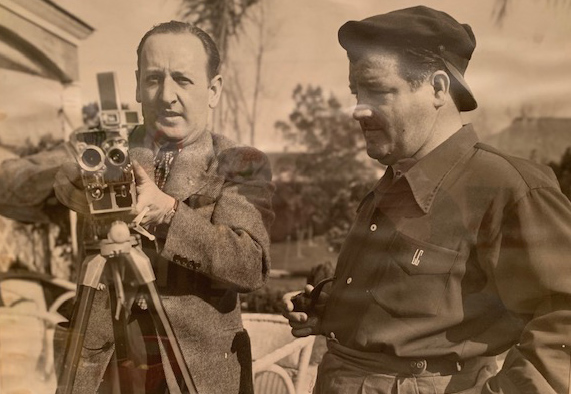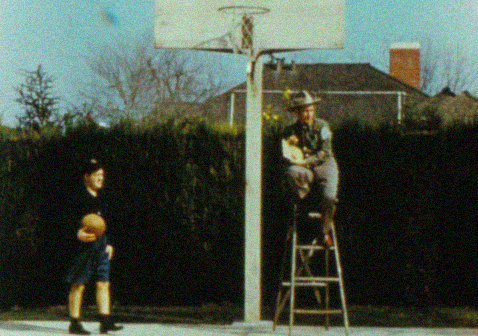
Graduating from Massachusetts College of Art in the late 1920s, artist Joseph Dephoure proved himself adept at business, art and technology. He enjoyed devising creative technical solutions to problems. Engaging his skills as an avid still photographer, for example, he assembled precise visual aids for orthodontists by placing two left-side or two right-side pictures of a patient's face together to make a full facial image.
He gradually worked his way into the motion picture business and in 1935, opened Dephoure Film Studios—later changed to "D4." A pioneer in his field, he wanted to provide his clients with the best possible finished film at a reasonable cost, so he slowly expanded his post-production facilities to provide complete and faster services in one location. He eventually acquired sound-recording and mixing capabilities—including a Maurer 16mm Optical Film Recorder—to transfer the finished magnetic tape to 16mm optical sound and then process it in his own laboratory. At that time, his was the only company that could print both the optical track and the finished film as well as provide both black-and-white film processing and color (by using the overnight service from Kodak color processing in Fairlawn, NJ.). One of the first to use 16mm in television, Dephoure often made kinescopes of live television programs, and he also formulated a high-speed developer for black-and-white original film processing to expedite films for television news long before video came into being.
For many years a one-of-a-kind facility, Dephoure attracted many individual film producers and commercial clients—including Polaroid, General Dynamics, RCA, the United States Air Force, Massachusetts General Hospital, and Harvard University Press for Harvard's Speed Reading Learning Films. With the additional capability to shoot in a soundproof studio, animate and create titles, it was an extremely efficient, consolidated studio and lab. When college student filmmakers needed services to finish their masterpieces, D4 Film was the place to go.
In 1948, Dephoure Film Studios filmed the first television program to air on New England's first station WBZ-TV and created one of the earliest animations on TV for a Victor Coffee ad. It also produced many of the original New England TV commercials for different ad agencies featuring celebrites such as John Wayne, commentator John Cameron Swayze, comedian George Gobel, news anchor Jack Chase and reporter John Henning. The famous Narragansett Beer ads with Curt Gowdy and Irene Hennessy were also filmed at Dephoure. Other commercials included those for the National Shawmut Bank, Oil Heat, NEPCO franks and Howdy Beefburgers.
Joseph retired to Florida in 1972, and his son Stephen—who had joined the company in 1965—helped start a Women’s Film Division in the early 1970s, enlisting a couple of female directors. Unfortunately, the effort did not pan out and was soon disbanded. In 1979 and 1980, D4 Film Studios made a popular ten-minute 16mm animated film for children called If Books Could Talk as a remake of the 1960 film The Magic Book. Distributed to schools all over the US, it taught children how to take care of books.
After fifty-seven years in business, Stephen Dephoure dissolved the corporation in 1992. Even though the company’s films were being distributed in video and digital formats, he felt his expertise was in 16mm post-production film services and did not wish to pursue those services in the format taking over the industry.
About the Collection
Before its last move from Newton to Needham in 1973 - 74, D4 Film Studios worked diligently to return all 16mm, audio tapes and other elements to its clients, hearing back from several that they did not want them. The collection at the Harvard Film Archive houses some of these "orphaned" prints, yet is mostly comprised of of films made by the studio. These include footage of the 1950 Boston Jubilee—featuring the "Miss Jubilee Contest" among other events; cowboy star Buck Jones in a 1930s Boston parade; WBZ-TV's inaugural program in 1948; construction of the Mystic River Bridge (now Tobin Bridge) in 1950; a 1951 film about Rockingham Park, a horse racetrack in New Hampshire; former Massachusetts governor Christian A. Herter in This Is Your City: These Are Your Children; reels of stock footage and over thirty TV commercials and public service announcements.
In 2013 the Harvard Film Archive preserved a rare film made by Dephoure, Abbott & Costello with Connie Haines (1943), an edited home movie in color featuring the three stars of The Abbott and Costello Show lounging and playing by a pool in Hollywood.
The collection is searchable in HOLLIS.
Thanks to Stephen Dephoure for providing a history of the studio.



